
The United States should be bracing itself for widespread coronavirus infections, according to a top official from the Centers for Disease Control and Prevention (CDC). "This might be bad," Dr. Nancy Messonnier, director of the Center for the National Center for Immunization and Respiratory Diseases (NCIRD), told reporters on Feb. 25. According the The New York Times, Dr. Messonnier said that hospitals, schools, and other facilities need to prepare for a coronavirus outbreak in the United States.
"It’s not so much of a question of if this will happen in this country any more but a question of when this will happen," she said. Dr. Messonnier continued, saying the coronavirus spreading in the United States might lead to school closures and tele-schooling, Market Watch reports. Hospitals, too, need to be prepared. CNBC reports that it's important for hospitals to delay elective surgeries and start triaging patients according to recognition of coronavirus symptoms.
Only 53 American cases of coronavirus, also called COVID-19, have been confirmed in the U.S. so far, according to CNBC, only two of which were spread by person-to-person contract in the country. The CDC's announcement also comes on the heels of a cluster of new cases reported in Italy, and 95 cases reported in Iran, CNN reports.
Medical experts emphasize that preparedness is far more important than panic. "People with COVID-19 coronavirus can experience a range of symptoms, from none at all to mild cold-like symptoms to severe breathing difficulty," says Dr. Andrew Diamond, CMO of One Medical, a membership-based primary care practice. "Fever and cough are the most common symptoms, whereas shortness of breath is rare but indicates a more serious form of illness." The vast majority of cases of coronavirus are mild or moderate, NPR reports, with most cases presenting similarly to seasonal flu.
Protecting yourself from the coronavirus is a lot like the steps you'd take to lower your odds of getting the flu. Washing your hands often with soap and water for at least 20 seconds is helpful for reducing infection rates, and if you can't get to a sink, carrying alcohol-based hand sanitizers will also kill germs. "Avoid touching your eyes, nose and mouth, especially with unwashed hands," Dr. Diamond recommends.
Staying home when you're sick is another way to prevent spreading any viruses you might come down with, all while giving yourself the rest your body needs. Dr. Diamond recommends using a telehealth service to connect with your doctor if you experience any respiratory symptoms or have any health questions. While the world waits to see exactly how the illness will spread, you can take all the precaution you need at home.
Experts:
Dr. Andrew Diamond, chief medical officer for One Medical